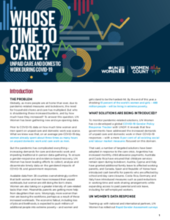This brief from UN Women explores who is shouldering the increased burdens of household care in light of the pandemic lockdowns and other restrictions and by how much those burdens have increased. Available data from 38 countries overwhelmingly confirm that both women and men have increased their unpaid workloads, but women are still doing the lion’s share. Women are also taking on a greater intensity of care-related tasks than men. Meanwhile, parents are getting more help from daughters than sons.
That said, a number of targeted solutions have been adopted in response to the care crisis. Argentina has increased monthly child allowance payments; Australia and Costa Rica have ensured that childcare services remain open during lockdown; Austria, Cyprus and Italy have granted additional family leave to affected working parents, and Canada, Spain and Republic of Korea have introduced cash benefits for parents who are affected by school and day care closures. Costa Rica, Germany and Italy have introduced measures such as paid reductions in working time and work-sharing arrangements while expanding access to paid parental and sick leave, including for self-employed workers.

